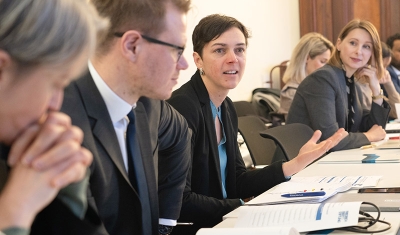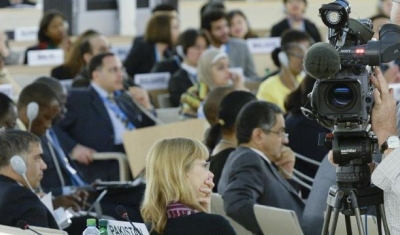Panel Discusses Human Rights and the Fight against Corruption during the Human Rights Council


Domenico Zipolli
21 September 2017
On Monday 18 September we organized, together with the Permanent Mission of Bolivia, a side event at the Human Rights Council on the fight against corruption with a human rights-based approach.
The discussion notably showcased experiences and best practices, highlighted that a detailed analysis of how corruption violates human rights is lacking, and analysed a human rights-based approach to fight corruption. Panelists also stressed the need for more precise definitions and methodological approaches to counter human rights violations linked to acts of corruption.
Our Manager of Policy Studies, Felix Kirchmeier, moderated the panel featuring presentation by Ambassador Nardi Suxo Iturry (Permanent Representative of Bolivia to the UN), Renate Winter (Chairperson of the Committee on the Rights of the Child), Richard Lapper (Human Rights Officer at the United Nations Office of the High Commissioner for Human Rights and Visiting Fellow at the Geneva Academy) and Martin Zapata (International Anti-Corruption Academy).
Best Practices
The first part of the discussion showcased experiences and best practices from the national and international levels. Bolivia’s efforts towards countering corruption through institutionalization and the Committee on the Rights of the Child’s strong commitment to underline the links between specific acts of corruption and human rights violations showed that opportunities do exist in the promotion of transparency and the fight against corruption for the protection of human rights.
Lack of a Detailed Analysis of How Corruption Violates Human Rights
Panelists also highlighted that despite the stated impact of corruption on the enjoyment of human rights, the issue receives comparatively little attention. Some mechanisms explicitly state that corruption is a human rights violation, but a detailed analysis of how corruption violates human rights is lacking.
A Human Rights-Based Approach
The latter part of the discussion consisted in an analysis of the human rights-based approach, defined as a victim-oriented approach, with emphasis on effective measures to prevent corruption-induced human rights violations and on access to remedies for victims. The panel also introduced concrete proposals to fight corruption, such as collective action, a methodology which promotes collaboration amongst the state, civil society and corporations. The event ended with a call for more precise definitions and methodological approaches to counter human rights violations linked to acts of corruption.













